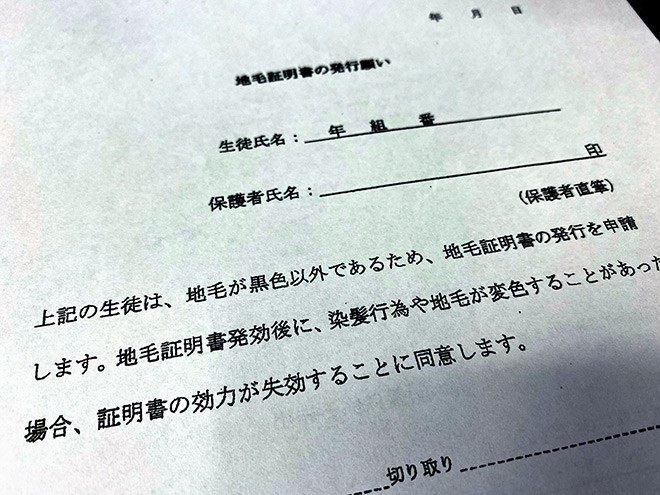
A hair color code is strictly applied to almost half of all high schools operated by the Tokyo metropolitan government.
Students attending classes with wavy hair or locks that are not uniformly black must submit a document signed by parents or guardians stating that this is their natural appearance.
The policy was adopted by more than 40 percent of such schools in the metropolitan area, according to members of the Japanese Communist Party in the Tokyo Metropolitan Assembly who questioned the edict.
The issue of school regulations covering hair color is one that has come before the courts and aroused international interest in the rigid system that governs Japanese schools to encourage compliance.
JCP, notifying the violation of human rights, filed a request for disclosure of information and was rewarded with a pile of documents handed over by the Tokyo Metropolitan Board of Education.
Of the 177 metropolitan high schools for full-time students, 150, or 84.7 percent, had some form of hair regulation. Seventy-nine schools, or 44.6 percent of the total, required students to submit documents signed and sealed by parents to certify that they were born with a natural wave in their hair or a different color than black.
According to the documents, some schools even asked for photos of certain students when they attended elementary or middle school to confirm the veracity of the details provided. In other cases, students were required to provide documents from their doctors to support their claims about the natural condition of their hair.
Some schools invalidated the documents if the student dyed his hair once or had a permanent at a hair salon.
Some schools used a color scale so that students could note their hair color.
Education council officials insisted that documents are needed to avoid situations where teachers scold students about their hair based on misperceptions.
They added that notifications had been sent to individual schools, asking them to explain to students and their parents that the submission of documents was entirely voluntary.
However, a study by the JCP bloc at the Tokyo Metropolitan Assembly found that only five high schools mentioned that they said so.
“Registering a student’s hair color is a human rights violation similar to requesting to register their skin color,” said a JCP member. “It is a natural right to have the hair with which the student was born and it is not something that must be approved by others.”